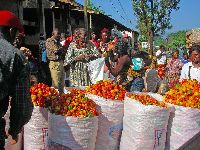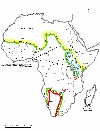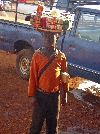|
Cameroon / Cameroun: Country of Contrast |
||
| Dispatch 2 - Mbouda | ||
|
Douala to Bafoussam (by bus) ‑Mbouda (23km, 14mi) We start in Bamileke
country, with its distinctive architecture and rich culture. |
||
|
After bicycling to the edge of the increasingly sprawling Douala, we escaped the humid coastal plains to higher, inland country, by bus. Our group pretty much filled the last remaining empty seats in the bus so it was it just another hour before the bus pulled out. Some of our travel mates had been sitting on the bus for four hours wait for the bus to fill. The engine is left running the whole time (not to run the air conditioner -- there is not), but the bus hadn't move an inch. At one point after every seat on the bus was taken and when the conductor tried to add another traveler things started to get a bit testy passengers. When the show finally seemed to be getting underway we drove across the road and spent another fifteen minutes fueling the bus and who knows what else. If you sense there are some disconnects here, you are not the only one.
A notable feature of the aspect of the bus trip into the interior was the number of police check points -- there could be several per mile. The driver didn't exhibit any surprise, disapproval, fatigue or any other emotion at any of the stops. Typically, as he got out of the bus he grab some papers and a small bill or some change. If the stops were to see if his papers were in order it would seem that given the number of times that he had been up and down the road he would know what was expected and would have been able to get his papers in order. Or maybe the bureaucracy and red-tape for getting the papers in order is to time consuming, expensive and arduous that it is just easier to disperse a little change at each stop than engage the bureaucracy. Or maybe his papers are in perfect order and the gifts are just part of the ritual for doing business on the that road -- it is worth remembering that Cameroon it at or near the top of annual lists of the world's most corrupt government officials.
An interesting pursuit and challenge in Cameroon is to make sense of all of the
languages. That academics list over 200 languages in the country -- mostly
of the Niger-Congo group.
Disembarking from the bus east of Mbouda we first encountered the language of Ngiemboon. As with all of the languages we encounter, the academic classification for Ngiemboon starts Niger-Congo>Atlantic Congo>Volta Congo>Benue-Congo>Bantoid>Southern. From there it is classified as Wide Grassfields>Narrow Grassfields>Mbam-Nkam>Bamileke -- a group of eleven language. Before we reached Mbouda the local language changed to Ngomba (also in the Bamileke group) and Befang (classified as Wide Grassfields>Menchum -- for which it is the only language in the group). Because Mbouda is a relatively big town and attracts people from the surrounding area there are probably additional languages spoken in some of the neighborhoods in town. It is interesting that even though all the languages in the area are Niger-Congo languages, none of the are closely related to original Niger-Congo languages of the area. All of the languages migrated away centuries ago and then encountered other dynamics and pressures with over centuries pushed them back again to where we find them today. Most of the languages in the Bamenda highlands and Grassfields trace there origins to the north. It was a process of one group attacking or encroaching on another, they would in turn relocate, which would encroach on another group who would in turn relocate, and so on.
|
Addendum: Despite the appearance of shenanigans at the check point while riding in buses on the roads of Cameroon, in over a thousand miles of bicycling in the country our groups have never been shaken down at a check point. Mostly we are just waved through with a pleasant greeting. On there rare occasions that someone is stopped it is usually out of curiosity about where we are going by bicycle, and then after an expression of surprise and disbelief, curiosity about where we have come from in such a fashion -- which is followed by more surprise and disbelief.
|
|
|
||
|
"Hosted by
DreamHost - earth friendly web hosting"
|
||
|
|










 Please
contact us
Please
contact us